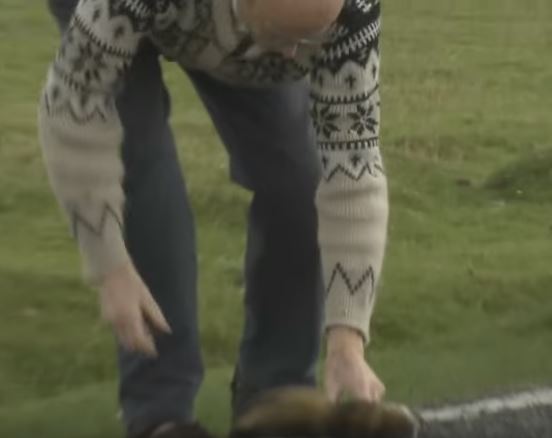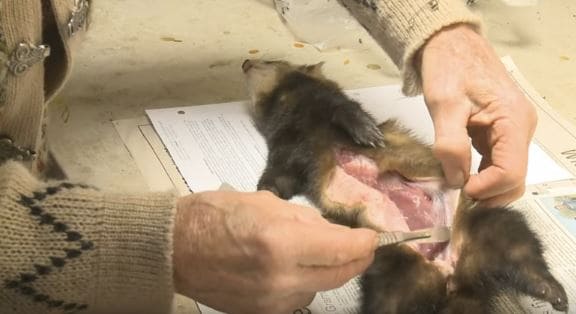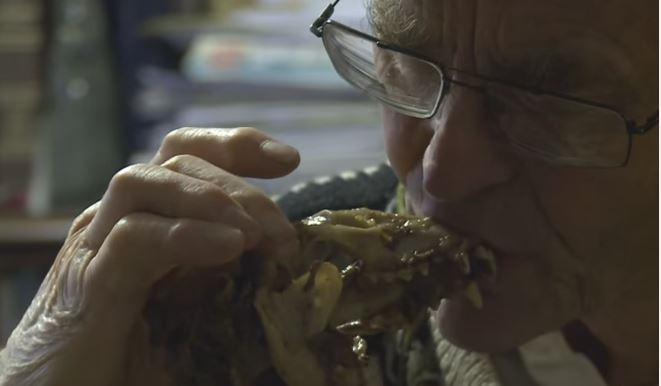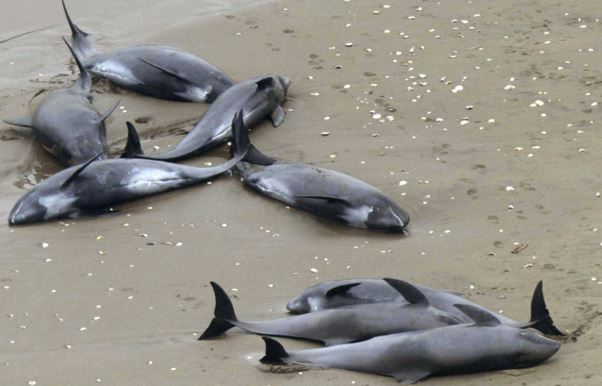Dolphin will be this year’s Christmas dinner for Arthur, who just eats roadkill meat. He says he found the aquatic marine mammal washed up on the beach and took it home. The only animal-sourced protein he ever consumes are found dead on roads or beaches, and include otters, squirrels, badgers, hedgehogs, rabbits, weasels and dolphins.
When Mr. Boyt, aged 76, finds a dead animal on the road, he either takes it home and cooks it for dinner that day, or freezes it for later. He says that for him, eating roadkill is a way of life.
His Christmas dinner last year was badger casserole.
Mr. Boyt, a retired biologist, said he found the dolphin, already dead, washed up on the beach near his home in Davidstow, north Cornwall, in the southwest of England.
 According to Arthur, if you keep your eyes open when driving around, there are rich pickings to be had.
According to Arthur, if you keep your eyes open when driving around, there are rich pickings to be had.
As far as the law is concerned, Mr. Boyt may find his action is illegal this time. All dolphins found on the coast of the United Kingdom belong to the Crown. So, he may have to get the OK from the Queen.
He said he had found a dolphin before on that very same beach and ate it, and described the taste as ‘delicious’.
Roadkill in keeping with the spirit of Christmas
The Express & Echo quoted Mr. Boyt as saying:
“When I found the dolphin on the beach I collected what meat joints I could and I kept them in the freezer for special occasions such as Christmas. It tastes so delicious.”
“The great thing about roadkill is that you are getting meat without the guilt of killing an animal or having one killed on your behalf. It’s a situation much more in keeping with the spirit of Christmas.”
 Mr. Boyt believes there are many people who would benefit from having roadkill. He said “Who knows where … or what the meat is that you buy across the counter at the butchers? If they sell us horse-meat when we think we’re buying lamb, what else are we being served?”
Mr. Boyt believes there are many people who would benefit from having roadkill. He said “Who knows where … or what the meat is that you buy across the counter at the butchers? If they sell us horse-meat when we think we’re buying lamb, what else are we being served?”
Mr. Boyt emphasizes that he does not intentionally run animals over in order to secure his supply of meat, and he accepts that his unusual culinary tastes are not to everyone’s liking.
He said he started getting nuisance telephone calls – people phoning up at 2 o’clock on a Sunday morning. “One chap pretended to be an animal that I had run over,” he commented.
Dead dolphins belong to the Crown
A spokesperson for the Whales & Dolphin Conservation, the leading international charity dedicated to the conservation and protection of whales and dolphins, said:
“Whales and dolphins are not public property – they belong to the Crown. If they do get washed up they should be removed by local authority. A washed up dolphin or whale could be riddled with disease so anyone eating the animal is putting themselves at serious risk.”
 Arthur sucking the last bits of juice from a badger’s skull.
Arthur sucking the last bits of juice from a badger’s skull.
“In the UK whales and dolphins (and porpoises) are classed as ‘Royal fish’. Essentially when they strand they are the property of the Crown. They should not be removed by members of the public. Even if that were not the case, it is a very unwise thing to eat dead whales or dolphins that wash up on the shore.”
“They can carry diseases which are transferable to humans, and are usually taken away by local authorities to be buried in landfill.”
A roadkill eater since he was a boy
According to Mr. Boyt, he has been eating roadkill since he was thirteen years old. His most unusual meal was a bat he found while on holiday and brought back home.
 What should be done with these dead dolphins? Bury them in landfill or let Arthur eat them?
What should be done with these dead dolphins? Bury them in landfill or let Arthur eat them?
He is spending Christmas day with his mother-in-law, who is preparing a traditional turkey. His wife, Su, is vegetarian, so neither dolphin nor turkey for her.
If you find a stranded dolphin or whale, the Government says you should call the Cetacean Strandings Investigation Programme (CSIP) hotline – 0800 652 0333. If the animal is alive, call immediately.
In its Wildlife and Diodeversity section of its website, the Government writes:
“Give as much information as possible about the animal’s location and condition to the CSIP. It’s important to take care when near a stranded dolphin or whale, as the tail is powerful and can cause injury. Gloves should also be worn when handling a living or dead animal.”
Video – The man who eats roadkill
